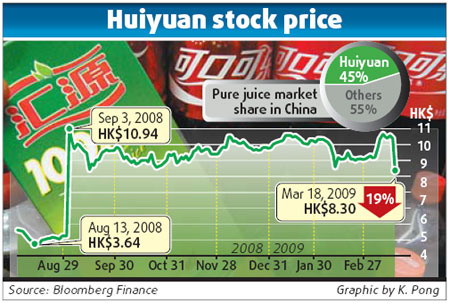
|
CHINA> National
 |
|
Coke bid for juice maker turns sour
By Diao Ying and Ding Qingfen (China Daily)
Updated: 2009-03-19 07:22 The government rejected Coca-Cola's plan to acquire beverage maker China Huiyuan Juice Group Ltd for $2.4 billion on Wednesday, citing the country's anti-monopoly law. The acquisition by Coca-Cola, announced last September, would have been the largest ever buyout of a Chinese company by a foreign rival.
"If the acquisition went into effect, Coca-Cola was very likely to reach a dominant position in the domestic market and consumers may have had to accept a higher price fixed by the company as they would not have much choice," the statement said. The MOC launched an anti-trust investigation on Nov 11 to determine whether the acquisition would harm other rivals, consumer rights or technological innovation.
 The bid was the first major deal to test the Anti-Monopoly Law, which took effect on Aug 1 last year. If passed, the deal would have been Coca-Cola's largest overseas acquisition and the company would have been able to expand its dominant position in the carbonated drinks market to the juice market. The ministry said that Coca-Cola and Huiyuan are major brands in the juice market, and therefore, the combination would have restricted competition in the industry and made it more difficult for other players to enter the sector. The ministry said the deal would also have squeezed development space for other small- and medium-sized enterprises, and is not good for the development of the country's juice industry. Huiyuan said yesterday that it respects the decision made by the ministry, and production would continue as normal. The company's share dived 19.24 percent to HK$8.30 yesterday before trading was suspended shortly after the market opened in the morning.
Muhtar Kent, president and chief executive officer of Coca-Cola, said: "We are disappointed, but we also respect the MOC decision." He said the company had put a tremendous effort into providing all the relevant materials to the MOC to ensure that they had all the information available and understood the transaction. "We were looking forward to working with the excellent Huiyuan team to stimulate new growth for the Huiyuan brand." He said the company will now focus all of its energies and expertise on growing existing brands and continuing to innovate with new brands, including in the juice segment. Huang Wei, beverage analyst at China Jianyin Investment Securities, said: "The ministry's decision is not surprising. But it's not good for Huiyuan, whose market share will probably shrink as international players such as Coca-Cola invest more in the juice market." Coca-Cola's offer to buy the Hong-Kong listed company was seen as a major strategic move to tap China's fast growing juice market. While the world's largest soft drink manufacturer dominates the carbonate market in China, its share in the juice market is relatively small. On the other hand, Huiyuan is the largest juice beverage maker in China, with over 45 percent of the pure juice market in the country. It also controls more than a tenth of the Chinese fruit and vegetable juice market that grew 15 percent last year to $2 billion. Coca-Cola has a 9.7 percent market share and dominates in diluted juices. China is Coca-Cola's fourth-largest market and a key battleground with rival PepsiCo Inc. Huiyuan's founders and major shareholders had endorsed the sale as a way for the company to improve product development and marketing. An MOC official said Coca-Cola had tried to address the negative effects on competition after it sought government approval for the deal in November, but its efforts did not meet the requirements of regulations. "It is only an isolated case, and it does not suggest any change in China's policy on foreign investors," the official said. The MOC said it has investigated 29 proposed acquisitions under the anti-monopoly law since August and approved 24. Xinhua, Reuters and AP contributed to the story |
|||||
主站蜘蛛池模板: 欧美手机手机在线视频一区 | 欧美成人免费看片一区 | 日韩久久久精品首页 | 成年视频国产免费观看 | 久草视频资源在线 | 国产高清天干天天视频 | 日本免费网址 | 国产伦精品一区二区三区免费 | ccyycom草草影院成人91 | 欧美一区二区三区精品 | 免费国产高清视频 | www国产| aaa大片 | 国产视频一区二区三区四区 | 热99re久久精品2久久久 | 欧美精品hdvdeosex4k | 国产乱码精品一区二区三区四川人 | 亚洲精品国产成人一区二区 | 男女晚上爱爱的视频在线观看 | 免费黄色在线网址 | 国产成人精品亚洲2020 | 日本aaaa片毛片免费观看 | 91亚洲免费 | 美女舒服好紧太爽了视频 | 特黄特色三级在线播放 | 亚洲国产人成中文幕一级二级 | 91精品国产91久久久久 | 久久精品三级视频 | 偷自拍第一页 | 亚洲精品成人网 | 国产在线精品二区韩国演艺界 | 在线观看国产情趣免费视频 | xx欧美老妇 | 波多野结衣一级 | 亚洲素人在线 | 天空在线观看免费完整 | 美女张开双腿让男人桶 | 久久久久久久久久久久久久久久久 | 美女张开腿让男生桶出水 | 在线免费观看国产 | 免费看成人 |